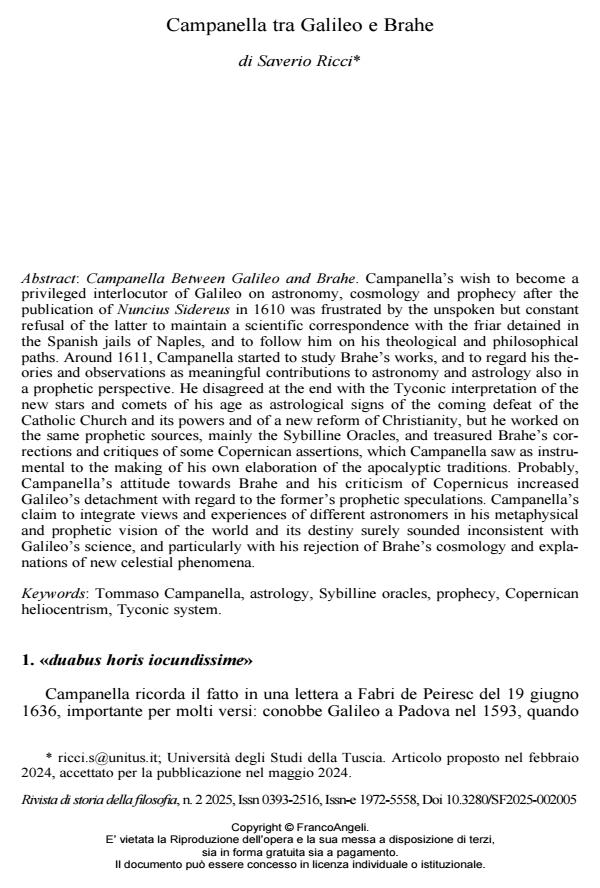Campanella tra Galileo e Brahe
Titolo Rivista RIVISTA DI STORIA DELLA FILOSOFIA
Autori/Curatori Saverio Ricci
Anno di pubblicazione 2025 Fascicolo 2025/2
Lingua Italiano Numero pagine 25 P. 238-262 Dimensione file 340 KB
DOI 10.3280/SF2025-002005
Il DOI è il codice a barre della proprietà intellettuale: per saperne di più
clicca qui
Qui sotto puoi vedere in anteprima la prima pagina di questo articolo.
Se questo articolo ti interessa, lo puoi acquistare (e scaricare in formato pdf) seguendo le facili indicazioni per acquistare il download credit. Acquista Download Credits per scaricare questo Articolo in formato PDF

FrancoAngeli è membro della Publishers International Linking Association, Inc (PILA), associazione indipendente e non profit per facilitare (attraverso i servizi tecnologici implementati da CrossRef.org) l’accesso degli studiosi ai contenuti digitali nelle pubblicazioni professionali e scientifiche.
Campanella’s wish to become a privileged interlocutor of Galileo on astronomy, cosmology and prophecy after the publication of Nuncius Sidereus in 1610 was frustrated by the unspoken but constant refusal of the latter to maintain a scientific correspondence with the friar detained in the Spanish jails of Naples, and to follow him on his theological and philosophical paths. Around 1611, Campanella started to study Brahe’s works, and to regard his the- ories and observations as meaningful contributions to astronomy and astrology also in a prophetic perspective. He disagreed at the end with the Tyconic interpretation of the new stars and comets of his age as astrological signs of the coming defeat of the Catholic Church and its powers and of a new reform of Christianity, but he worked on the same prophetic sources, mainly the Sybilline Oracles, and treasured Brahe’s cor- rections and critiques of some Copernican assertions, which Campanella saw as instru- mental to the making of his own elaboration of the apocalyptic traditions. Probably, Campanella’s attitude towards Brahe and his criticism of Copernicus increased Galileo’s detachment with regard to the former’s prophetic speculations. Campanella’s claim to integrate views and experiences of different astronomers in his metaphysical and prophetic vision of the world and its destiny surely sounded inconsistent with Galileo’s science, and particularly with his rejection of Brahe’s cosmology and expla- nations of new celestial phenomena.
Parole chiave:Tommaso Campanella, astrology, Sybilline oracles, prophecy, Copernican heliocentrism, Tyconic system.
Saverio Ricci, Campanella tra Galileo e Brahe in "RIVISTA DI STORIA DELLA FILOSOFIA" 2/2025, pp 238-262, DOI: 10.3280/SF2025-002005